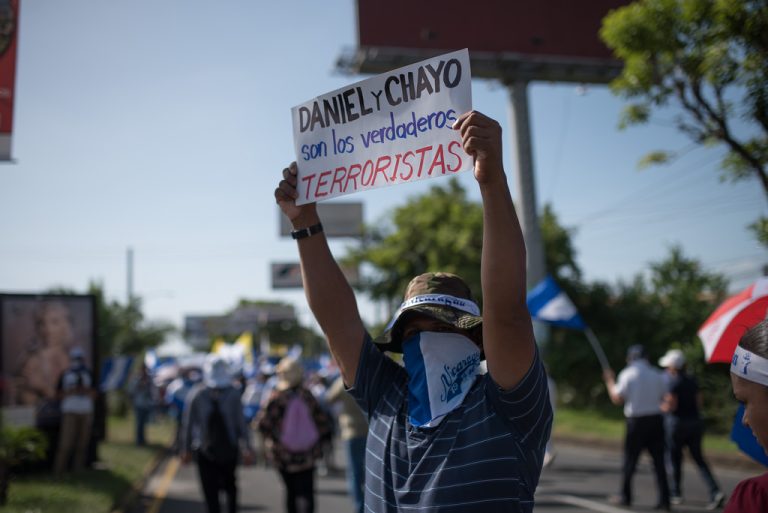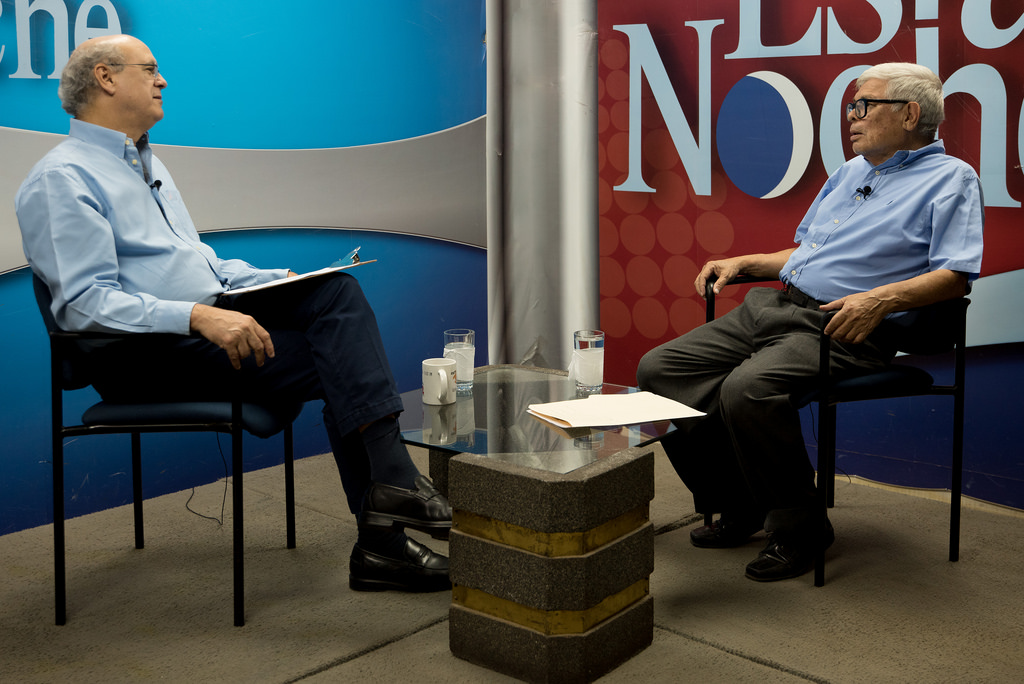16 de septiembre 2018

Children of Exile: The Births “Sowing Hope” in the Camp of Nicaraguan Farmers

PUBLICIDAD 1M
PUBLICIDAD 4D
PUBLICIDAD 5D
Appeal filed to have the Law of Financing Terrorism overturned as partially unconstitutional: “Who classifies a group as terrorist?” they ask.

Appeal filed to have the Law of Financing Terrorism overturned as partially unconstitutional: “Who classifies a group as terrorist?” they ask.
The Observatory for Transparency and against Corruption presented an appeal of partial unconstitutionality against Law #977, the Law of Financing Terrorism, based on the consideration that this law violates several fundamental rights of Nicaraguan citizens.
Last July, the National Assembly approved the so-called “Law against money laundering, financing terrorism, and financing the proliferation of weapons of mass destruction.” The law imposes sentences of 15-20 years in jail to those persons categorized as terrorists by the regime in power.
In practice, what that law does – especially article 44 – is to reform articles 394 and 395 of Nicaragua’s penal code, modifying the definition of terrorism and of financing terrorism.
According to the appeal presented on September 10th, to the Nicaraguan Supreme Court, the new wording of those articles violates the country’s Constitution because it contradicts articles 52, 53 and 54 of the Nicaraguan Carta Magna.
The constitutional articles cited establish the right of Nicaraguans to petition their government, both individually and collectively; to denounce anomalies; and to voice criticism of State powers or any authority. Also, the new law would annul the right of peaceful assembly via public gatherings, protest demonstrations or public mobilizations.

Former Attorney General Alberto Novoa appearing with Carlos F. Chamorro on the nightly television news program “Esta Noche”. Photo: Carlos Herrera / Confidencial
Lawyer Alberto Novoa, expert in penal law and former Attorney General of Nicaragua, was one of those who introduced the appeal. He feels that this Law (977) “also violates Article 25, item 3 of our constitution that speaks of the right to security.”
“As a citizen, I have a right to my legal, physical and other security, and here they’re annulling that right. It also violates Article 27 of the Constitution that states that we’re all equal before the law, because this new law establishes a different category of citizens,” he emphasized.
Novoa noted the great importance of protecting the right to petition the government: stemming from this right, people can demand the resignation of the President of the Republic, and that’s not a coup d’état nor a terrorist act. “Moreover, the president should respond to those who are asking him to resign,” he asserted.
The deputies allied with Ortega approved a law closely tailored to the presidential couple’s ambitions. Under this law, anyone can be considered a terrorist, up to and including the old woman who presented each of the participants in the National Dialogue with a little bag of cold water.
Effectively, the new legal text considers that the citizen who collects, receives, channels or transfers funds to be utilized for that type of activity is guilty of a terrorist act… even if the resources in question were never used to sponsor an activity that those in power consider “terrorist”.
“It states: ‘he who belongs to a terrorist group.’ But who can classify a group as terrorist? There’s no universal definition of a terrorist group. They can be classified by their actions, but there’s no one who can say ‘this is terrorist’. Maybe the United Nations has some classification,” the lawyer speculated.
Given that it’s such a broad and exhaustive definition, “even the Catholic Church would fall under that definition, because people came to the Managua Cathedral to leave food, water, bandages and other first aid materials for the protestors. This penal categorization could extend to such absurdities!” he exclaimed.
Again, using this concept, “even dona Coquito, the woman who gave away little bags of cold water, would be financing terrorism,” he continued.
Novoa also warned against typifying any crime in such a broad manner, because it lends itself to many possible interpretations.
“The word ‘terrorism’ or the penal concept of ‘terrorist’ speaks of damages, but someone could be damaged by words, their image could be damaged, or they could suffer physical or economic damage. It’s so broad that it leaves any judge full discretion to interpret the law in their own way,” he warned.
The former prosecutor also corrected the legislature, because when Law #977 speaks of altering the Constitutional order or of obligating a government to do something, or abstain from doing it, “that’s the crime of rebellion, not terrorism. The crime of rebellion has been contemplated in our legislation since the nineteenth century,” he explained.
When someone rebels in order to topple a government and is then arrested, they become a “political prisoner for demanding the overturn of the government. But they’re not terrorists, because their actions didn’t alter the public order, nor did it create turmoil among the population, nor did it alter the individual and social psyche,” Novoa reasoned.
Putting together all those considerations, he feels that “the university professors in Nicaragua are under an obligation – as much by the Constitution as under Penal Law – to explain to their students what the legal situation is in this case.”
“This penal law violates Nicaragua’s Constitution. It violates the rights and guarantees established in this Constitution. In another situation, in a democratic state under rule of law, this law would immediately have been declared unconstitutional.”
In reference to the draconian powers that the law gives to the Financial Analysis Unit, the Attorney General and the State to freeze the funds of businesses, foundations and NGOs, just by declaring them terrorist, Novoa said that such a measure “violates the principle of presumed innocence”.
“This principle says that the State can’t classify me as a criminal, it must presume that I’m innocent. How can you incarcerate an innocent person or freeze their accounts? It’s absurd! This law violates that principle,” he insisted.
Former Attorney General Novoa further stated that although he’d introduced this appeal on the grounds of unconstitutionality, he doesn’t have a lot of hope that the magistrates will rule on it at all, much less that they’d rule in his favor.
“I’m not very optimistic that they’ll rule in favor of the appeal, because this law is the political will of those in power… the majority, nearly all [of the magistrates], bow down to the powers that be and there’s only one political will being manifest there,” he noted.
“I’ve been asked: ‘if you don’t believe in that [process], why did you file this appeal?’ My reply is: to establish a precedent, and because with this gesture we’re exhausting the internal channels, so that in the future we’ll be able to make our case at other levels, in hopes that one day the situation may change.”
Whether or not this wish is fulfilled depends on whether or not there’s “a social change, a new political pact, a new social pact. There must be one. Under the current conditions, those transformations can’t take place. There’s no way. You can’t hope for them.” He concluded.
Archivado como:
PUBLICIDAD 3M
Periodista nicaragüense, exiliado en Costa Rica. Durante más de veinte años se ha desempeñado en CONFIDENCIAL como periodista de Economía. Antes trabajó en el semanario La Crónica, el diario La Prensa y El Nuevo Diario. Además, ha publicado en el Diario de Hoy, de El Salvador. Ha ganado en dos ocasiones el Premio a la Excelencia en Periodismo Pedro Joaquín Chamorro Cardenal, en Nicaragua.
PUBLICIDAD 3D